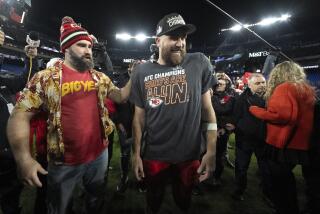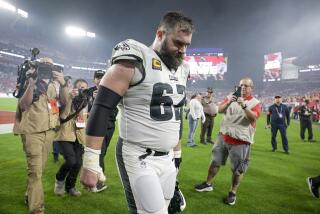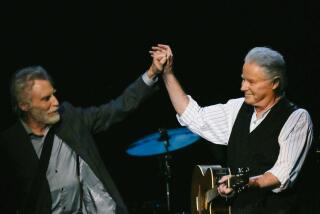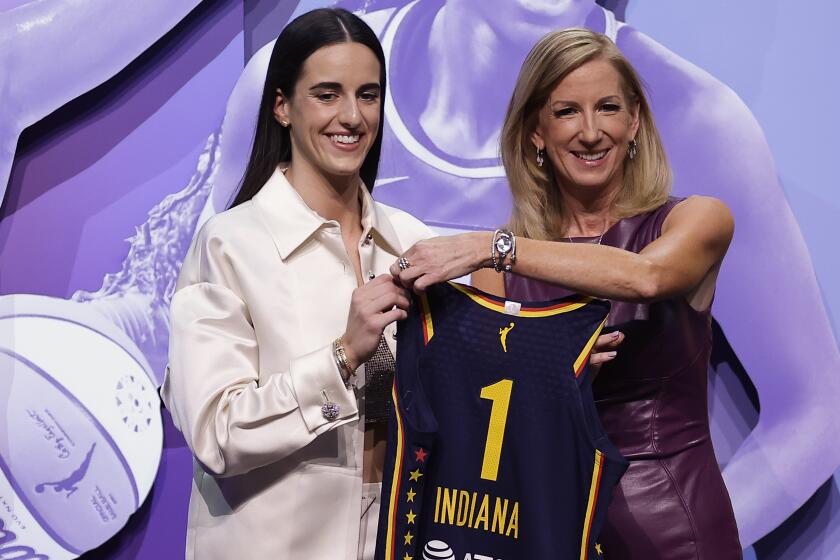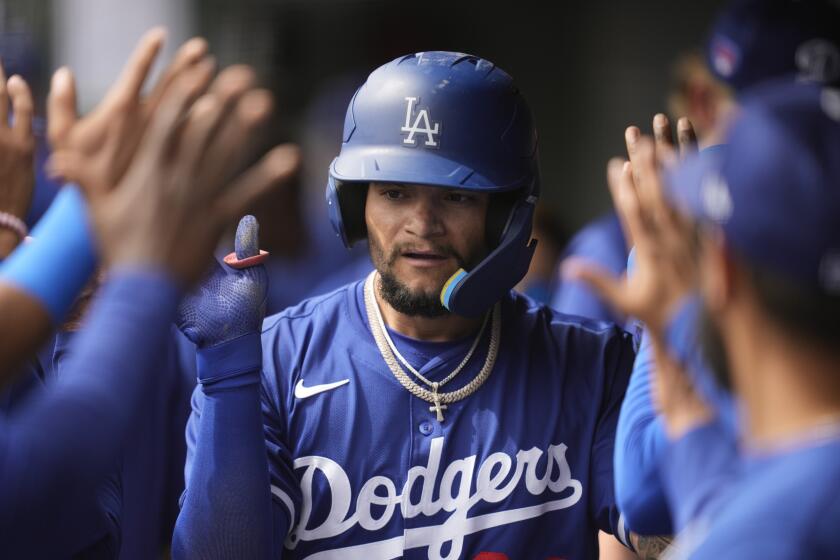Eagles’ Super Bowl hopes aren’t over after Carson Wentz injury, and Bill Parcells explains why
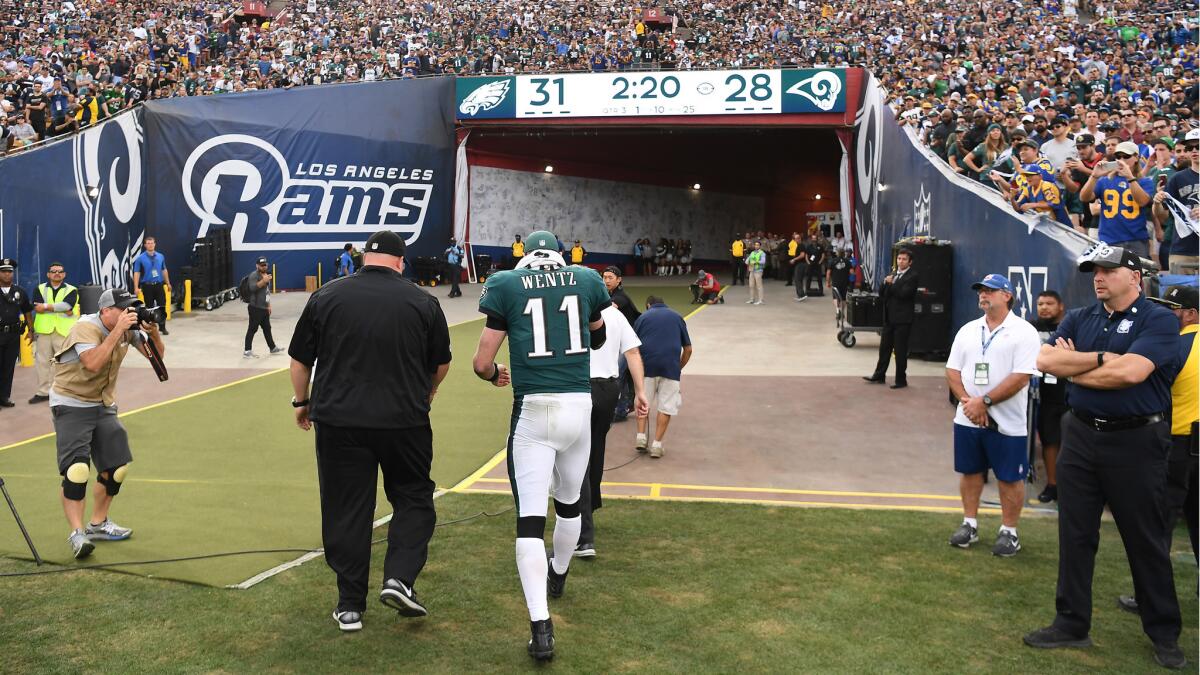
Philadelphia is a city in mourning, but also one with a flicker of hope.
A day after Eagles quarterback Carson Wentz hobbled off to the Coliseum locker room during the third quarter against the Rams, the grim news was confirmed: The NFL most valuable player candidate suffered a torn anterior cruciate ligament in his left knee, ending his season and perhaps Philadelphia’s best chance for its first Lombardi Trophy.
The Eagles clinched the NFC East with their 43-35 victory, but now are forced to move forward without their second-year star. Nick Foles steps into the starting role. Coach Doug Pederson tried to put as positive a spin as possible on the situation at his news conference Monday. Asked if his team can overcome this, he didn’t hesitate.
“It sure can, heck yeah,” Pederson said. “We overcame [losing] a Pro Bowl left tackle. We overcame our middle linebacker. We overcame our running back. We’ve overcome a core special-teams player this year. This is no different.
“But you know what, the reason we went out and got Nick Foles was for reasons like this and situations like this. I’m excited for Nick. I hate it for Carson Wentz. I hate it for the career, the season, I guess, that he’s been having. But at the same time, it’s been the next-man-up mentality, and that’s how we approach it.”
The 11-2 Eagles have the NFC’s No. 1 seed with three games remaining: at the New York Giants, and home against Oakland and Dallas.
Foles played for the Eagles from 2012-14 before spending the next two seasons with the Rams (2015) and Kansas City (2016). He had one spectacular season in Philadelphia — never coming close to that before or since — when he threw 27 touchdowns with two interceptions in 2013.
There is significant precedent for teams using multiple quarterbacks and reaching or winning the Super Bowl.
San Francisco did that in 2012, when Alex Smith was sidelined with a concussion and never got his job back from Colin Kaepernick, whose team was edged by Baltimore in the Super Bowl.
In 2000, the Ravens benched Tony Banks at midseason and replaced him with Trent Dilfer. Baltimore lost its first game after the switch, but then, led by its phenomenal defense, went on to win 11 straight, culminating with a Super Bowl victory.
There were other teams that used multiple quarterbacks in championship seasons, among them Miami (Bob Griese and Earl Morrall), Dallas (Craig Morton and Roger Staubach), Pittsburgh (Joe Gilliam and Terry Bradshaw), and the Raiders in Oakland (Dan Pastorini and Jim Plunkett) and Los Angeles (Marc Wilson and Plunkett). The 1979 Rams got to the Super Bowl with both Pat Haden and Vince Ferragamo starting games.
In 1990, the Giants lost Phil Simms to a broken foot in the middle of December. Jeff Hostetler replaced him, leading the team to victories in its final two regular-season games. Those Giants, coached by Bill Parcells, would tear through the postseason with three wins for their second Super Bowl title.
“One of the main things I tried to do is explain to the team that Jeff Hostetler wasn’t going to be the reason why we didn’t succeed,” Parcells said by phone Monday. “I said, ‘If our team is good enough to do this, which I think we are, he’ll do his part.’ So I just tried to show confidence in Jeff, and I had confidence in him. You never really know what’s going to happen, but I didn’t feel like he was going to hold us back in any way.”
And Hostetler didn’t, throwing for three touchdowns and one interception in those regular-season games, and three more touchdowns with no interceptions in the postseason. The Giants beat Buffalo in the Super Bowl 20-19, a game best remembered for the wide-right field-goal attempt by Buffalo’s Scott Norwood at the end.
“The two weeks that we had [at the end of the regular season] were valuable to me, because we could put more emphasis on a few things that we wouldn’t have put emphasis on with Phil Simms,” Parcells said.
“Losing Wentz is a big hole, no doubt, but if the rest of the team is good enough to be champions, then there’s a good chance Foles will be OK.”
Retired quarterback Jeff Garcia understands precisely what it would mean to Eagles fans if Foles were to pick up where Wentz left off and make a playoff run.
Garcia is still beloved in Philadelphia after his magnificent performance in 2006, when he took over toward the end of the year after Donovan McNabb’s season-ending knee injury. After a blowout loss at Indianapolis in his first start, Garcia directed the largely written-off Eagles to five consecutive victories — including three division road wins in a row — and the NFC East crown. Those Eagles beat the Giants in the first round of the playoffs, then lost to New Orleans.
In eight games, Garcia had 10 touchdown passes, two interceptions and an impressive passer rating of 95.8. He also achieved local legend status.
“There’s absolutely an opportunity for Nick Foles,” Garcia said. “I’m sure if you look at my Twitter, you’ll still see Eagles fans wanting me to come back. That’s just the love and appreciation they have for me and what I was able to help the Eagles do back in 2006. They don’t forget. They’re very appreciative, and I appreciate that and how they think that,” laughing now, “even at 47 I can come back and do it.
“The way that people respond to me, it doesn’t seem like I’d ever have to pull my wallet out in that city. But I’d be more than happy to buy everybody a beer there and share one with them.”
Follow Sam Farmer on Twitter @LATimesfarmer
More to Read
Get our high school sports newsletter
Prep Rally is devoted to the SoCal high school sports experience, bringing you scores, stories and a behind-the-scenes look at what makes prep sports so popular.
You may occasionally receive promotional content from the Los Angeles Times.

